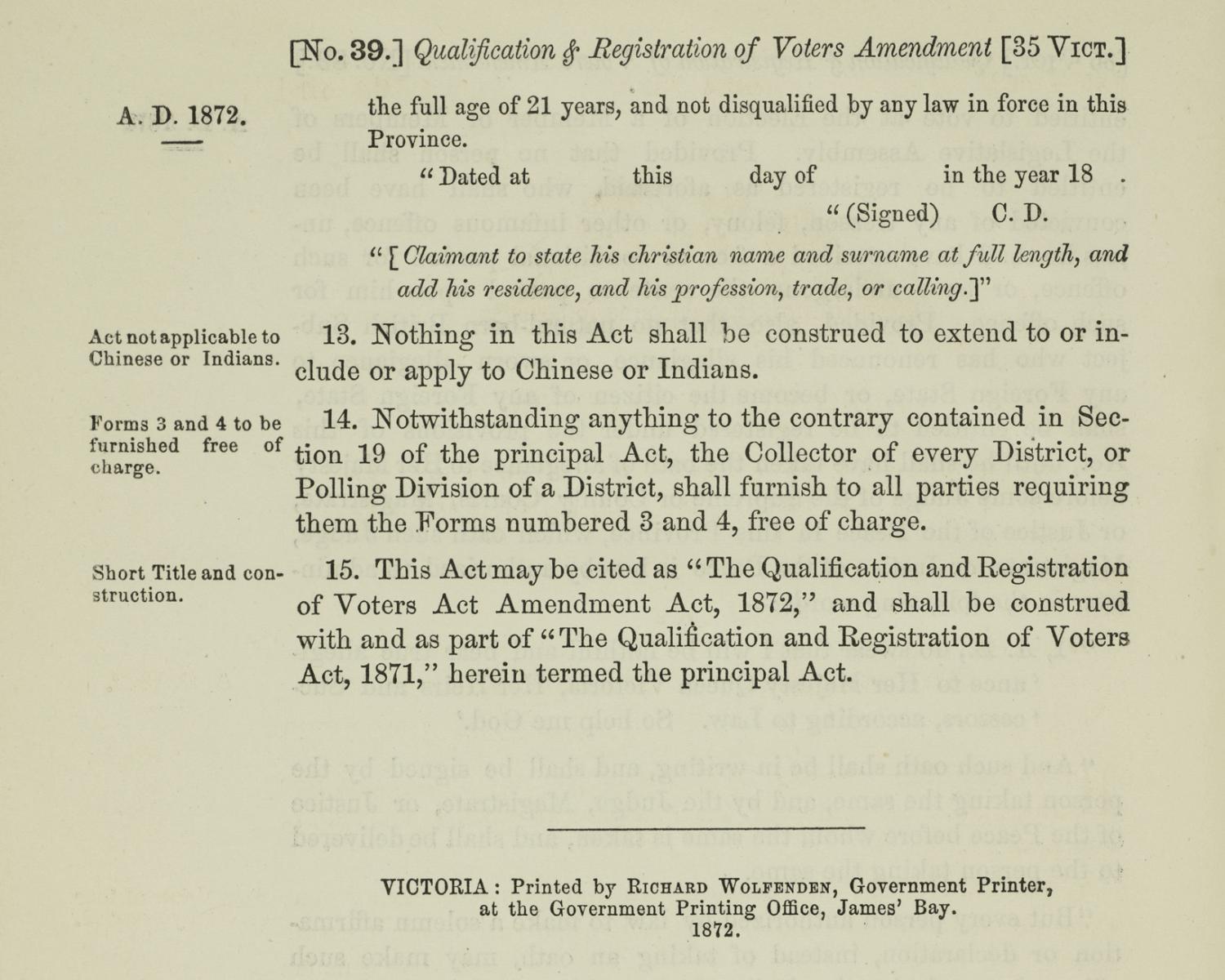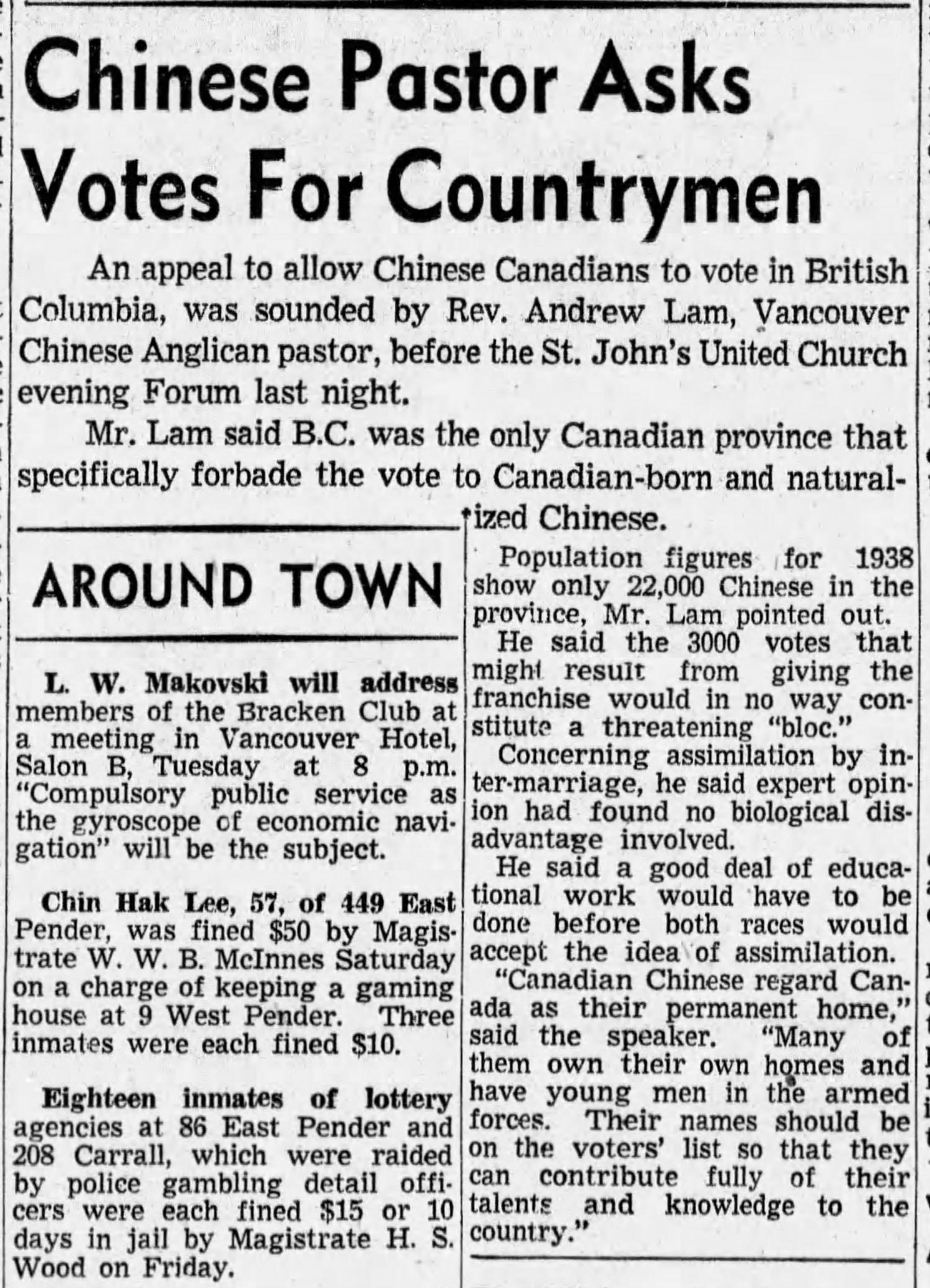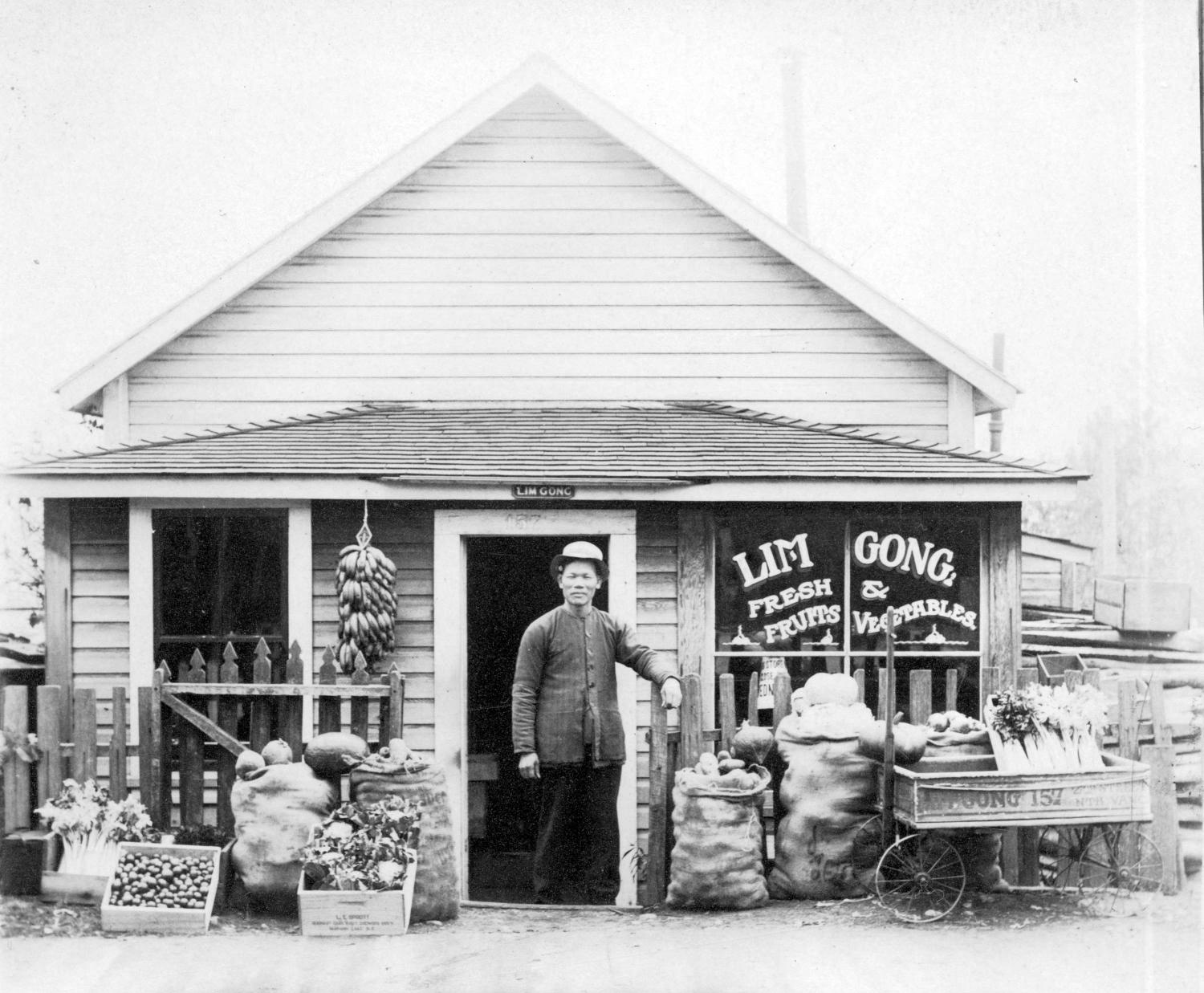Race-Based Voter Inequality
Chinese and Indigenous denied the right to vote in B.C.
Date: 1872
When British Columbia joined Canada in 1871, Indigenous people comprised more than 70 per cent of the population. European settlers made up less than a quarter. But strength in numbers didn’t equal political power. A year after becoming a province, B.C. denied Indigenous people the right to vote in provincial elections. The province’s Chinese community, which represented a little less than five per cent of the population, were also denied that fundamental right. And at the time, provincial rules determined who was eligible to vote in federal elections — shutting both communities out of the national discussion.
But it didn’t stop there. During B.C.’s first few decades as a province, it repeatedly passed legislation making politics the exclusive domain of white men. In 1876, B.C. made it illegal for Indigenous or Chinese people to vote in municipal elections. That same year, the province passed legislation explicitly barring Chinese people from running for provincial office. Soon after, B.C. passed a law that only allowed people on the voter roll to serve on juries, heavily tipping the scale of justice against people of colour. Then came a law preventing Chinese or Indigenous people from voting for school trustees. This pattern continued for years.
Depriving Chinese and Indigenous people of the right to vote went far beyond who had a say at the ballot box. In many ways, disenfranchisement laid the foundation for systemic racism. If your name wasn’t on the voter roll, you couldn’t pursue a career in law, medicine, accounting or pharmacology. At one point, only registered voters could legally sell liquor or acquire a logging license. For decades, this relegated most people of colour to lower-paying jobs and kept the country’s wealth in the hands of its white population. And since Chinese and Indigenous people — and, later, Japanese and South Asians — couldn’t vote, they had scant power to combat the racist discrimination they faced on a daily basis, from pervasive segregation to bigoted labour laws.
British Columbia was the first province to enact explicitly racist voter laws in the country. But B.C. wasn’t alone. In 1885, after thousands of Chinese men had toiled — and hundreds had died — building the last stretch of the Canadian Pacific Railway, the federal government passed a law banning all “Chinese or Mongolian” people from voting in national elections. The Chinese have “no British instincts or British feelings or aspirations, and therefore ought not to have a vote,” reasoned Prime Minister John A. Macdonald.
Progress came slowly. In 1924, the federal government extended voting rights to Indigenous veterans who served in the First World War. By the close of World War II, Indigenous, Chinese, Japanese and South Asian veterans living in B.C. could vote both provincially and federally. Finally — following a passionate voting rights campaign — the province granted all Chinese Canadians the right to vote in 1947. Two years later, B.C. extended the provincial franchise to its Indigenous population. However, it would take another 11 years before Indigenous people could vote in federal elections without being forced to give up their “Indian” status and the rights and privileges that come with it.
Sources:
- Begg, Michael. Legislating British Columbia: A History of B.C. Land Law, 1858-1978. University of British Columbia, 2007.
- Courtney, John C. "Right to Vote in Canada." The Canadian Encyclopedia, 18 Mar. 2007, https://www.thecanadianencyclopedia.ca/en/article/franchise.
- Discriminatory Legislation in British Columbia 1872-1948. Government of British Columbia, https://www2.gov.bc.ca/assets/gov/british-columbians-our-governments/our-history/historic-places/documents/heritage/chinese-legacy/discriminatory_legislation_in_bc_1872_1948.pdf.
- Dua, Enakshi. Scratching the Surface. Canadian Scholars’ Press, 1999.
- "Electoral History of B.C." Elections BC, 9 May 2008, https://elections.bc.ca/voting/outreach-and-education/electoral-history-of-bc/.
- Leslie, John. "Indigenous Suffrage." The Canadian Encyclopedia, 7 Apr. 2016, https://www.thecanadianencyclopedia.ca/en/article/indigenous-suffrage.
- Madokoro, Laura, et al., editors. Dominion of Race. UBC Press, 2017.
- McRae, Matthew. "The Chaotic Story of the Right to Vote in Canada." Canadian Museum for Human Rights, https://humanrights.ca/story/the-chaotic-story-of-the-right-to-vote-in-canada. Accessed 6 May 2021.
- Stanley, Timothy J. "The Chinese in Canada." Canadian History: Post-Confederation, edited by John Douglas Belshaw, 17 May 2016, https://opentextbc.ca/postconfederation/chapter/5-12-the-chinese-in-canada/.
- Taylor, Robert Ratcliffe. The Birdcages. FriesenPress, 2020.
- "Uneven Progress 1867-1919." Elections Canada, https://www.elections.ca/content.aspx?section=res&dir=his/chap2&document=index&lang=e. Accessed 6 May 2021.

![Group photo of the Nincumshin [Nin-cum-shin] tribe at Thompson River.](https://bc-timeline-backend.azureedge.net/sites/default/files/styles/gallery_resized/public/images/d-07272.jpg)



